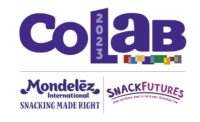Mondelēz opens applications for CoLab Tech accelerator
The program, in its second year, boosts growing companies focused on baked snacks.
.png?1713980286)
Courtesy of Whoa Dough
Mondelēz International has announced that applications are now open for the second year of its CoLab Tech program. This accelerator program, led by Mondelēz’s global R&D team, seeks early-stage companies that have developed innovative technologies in nutrition, ingredients, packaging, and sustainability. Past participants include Whoa Dough, Love Corn, and Popcorn for the People.
According to the company, CoLab Tech plays an important role in Mondelēz’s growth strategy to accelerate innovation in its core categories of chocolate, biscuits, and baked snacks. The selected cohort will provide the R&D team with early access to new capabilities that can help in the development of breakthrough products and platforms.
“Our R&D team is at the forefront of Mondelēz’s commitment to empowering people around the world to snack right,” says Ian Noble, VP of R&D at Mondelēz International. “As consumers increasingly prioritize personal well-being, planet-positive choices, and more interesting eating experiences, we need to look to groundbreaking entrepreneurs who have developed new tools and technologies that enable us to continue leading the future of snacking.”
This year’s CoLab Tech priority areas are:
- Packaging: Materials that are recyclable, high performing, and flexible; can enable a low environmental impact; and can support premium products.
- Ingredients: Enable innovation in core categories of chocolate, biscuits, and baked snacks with clean, ‘free from’ ingredients; sugar and calorie reduction; plant-based positive nutrition; functional actives; and elevated sensorial experiences.
- Sustainability: Can reduce environmental impact through water and energy-optimized ingredient mixing and product-forming solutions; more efficient and sustainable heating processes; efficient selective concentration and recovery of compounds; and novel bio-gas generation and supply solutions.
Paula Hemerly, CoLab Tech program manager, says the first CoLab Tech cohort has already demonstrated the value of ‘big and small’ working together to accelerate the promise of food technology.
“Last year’s cohort really opened our eyes to what’s possible in snack innovation,” Hemerly remarks. “We are already collaborating with some of the participants to put their technologies into practice and are very excited about what this new class will bring.”
The eight-week CoLab Tech curriculum consists of virtual sessions, one-on-one mentoring, and has the potential for proof-of-concept testing.
It is open to start-ups across the globe who have reached a minimum viable product in their development process and have a minimum of five employees. Start-ups with diverse and minority board members will be considered a plus for selection. For more information and to apply to the CoLab Tech program, visit snackfutures.com.
Looking for a reprint of this article?
From high-res PDFs to custom plaques, order your copy today!







